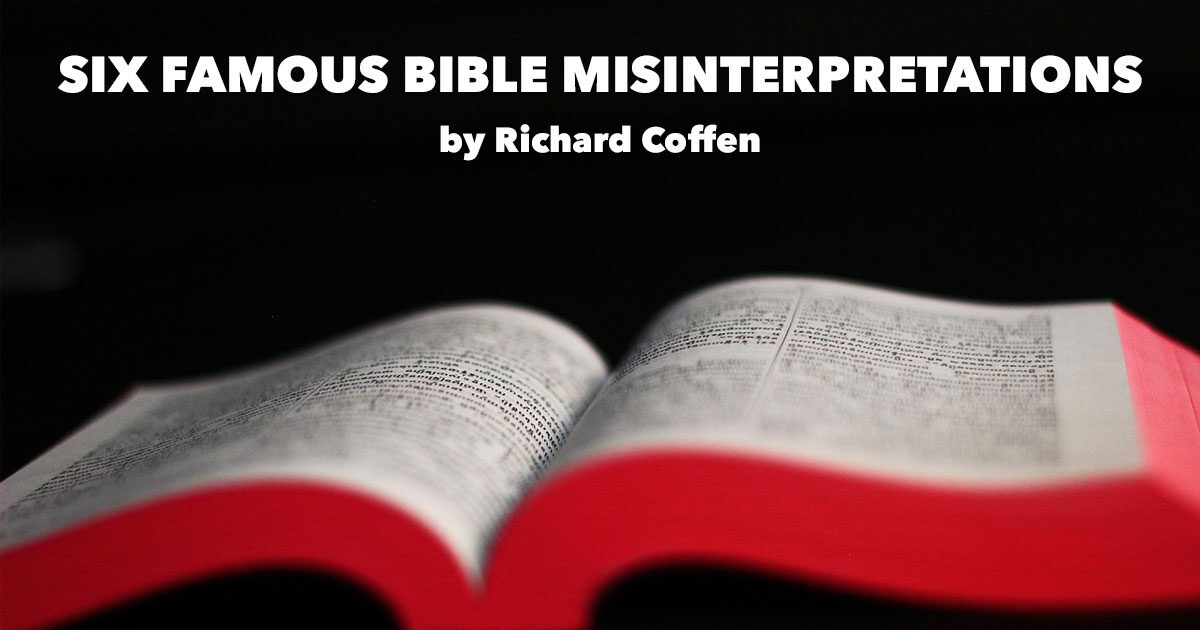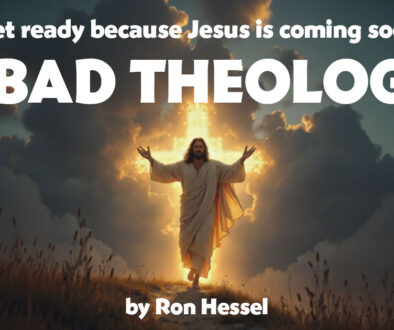Six Famous Bible Misinterpretations
by Richard W. Coffen | 1 August 2025 |
Two decades after the King James Version was first printed, royal printers Robert Barker and Martin Lucas received exclusive rights to print an edition with typos corrected. A worker typesetting the seventh commandment accidentally dropped a word out, and rendered it thusly: “Thou shalt commit adultery.” Oops! The duo lost their license to print, and paid a stiff fine, equal to $85,000 today. Barker languished and died in debtor’s prison.
Most of us have heard interpretations that make biblical passages say what the author didn’t intend. In this essay I offer a few examples you’ve likely encountered.
Eve and the snake
It is commonly believed that Adam and Eve in Eden wore radiant garments, and that prior to the episode at the taboo tree Eve had wandered from Adam. What says Scripture?
In fact, Eve was naked as a newborn (Genesis 2:25; Hebrew: ‘ārōm) and found herself at the Tree of Knowledge of Good and Evil. Entangled in the boughs of this tree (actually, the snake’s position isn’t specified in the Bible) lurked a chatty snake that had a reputation for being cleverer (Hebrew: ‘ārûm; pun on ‘ārōm—Hebrew authors enjoyed punning) than any other fauna that YHWH had created (Genesis 3:1).
The narrative asserts that Adam was “with her” at the tree (Genesis 3:6, most translations), though she alone conversed with the loquacious snake. Also, it was Eve who handed some of the forbidden fruit to her husband.
But the other ideas aren’t in the Bible. Early Christian theologian Ephram the Syrian (A.D. 306-373) might have been the first to say that the primordial couple wore robes of light. Milton in Paradise Lost may have been the first to claim that Eve had strolled from Adam’s side.
No forgiveness
You may have heard contemporary preachers say that animal sin offerings didn’t and couldn’t provide forgiveness—that, in short, the sacrificial system was spiritually unproductive. This contradicts YHWH’s affirmation that they “shall make an atonement for them, and it shall be forgiven them” (Leviticus 4:20). Ten times Leviticus repeats that atonement and forgiveness were caused by animal sacrifice.
Nonetheless, the author of Hebrews wrote:
“It is not possible that the blood of bulls and of goats should take away sins. . . . Sacrifices . . . can never take away sins” (10:4, 6, 11).
He or she here brazenly contradicts the Torah—because YHWH says clearly that animal sacrifices did indeed provide forgiveness.
Hand scars
Arguably the most famous painting by Harry Anderson is the one titled “What Happened to Your Hand?” Several youngsters are with Jesus, and a little blonde girl sitting on his lap points to his hand asking: “What happened to your hand?”
The story is told that T. K. Martin, art director at the Review and Herald Publishing Association at the time, had referred Anderson to Zechariah 13:6, where someone inquires: “What are these wounds in thine hands?”
Was this question posed to the post-resurrection Jesus? Hardly. The context refers to a problem that preceded Jesus by 550 years. The background is pagan “prophets”:
“On that day, I will banish the names of the idols from the land, and they will be remembered no more,” declares the Lord Almighty. “I will remove both the prophets and the spirit of impurity from the land. And if anyone still prophesies, their father and mother, to whom they were born, will say to them, ‘You must die, because you have told lies in the Lord’s name.’ Then their own parents will stab the one who prophesies” (Zechariah 13:2-3).
Being disowned by parents means losing honor: “Every prophet will be ashamed” (vs. 4). That’s why the false prophet turns to subterfuge: “I am not a prophet. I am a farmer” (vs. 5). His parents know better!
You recall from a 300-year-previous incident atop Mt. Carmel that heathen prophets engaged in self-mutilation. Evidently, the practice continued. So, when the false prophet claimed to be a farmer, his accuser would produce incontrovertible evidence: “What are these wounds on your body?” (verse 6). (Most versions say “body” or “chest,” not hands.) A farmer wouldn’t have self-mutilation scars! The dishonest prophet lies: “I got this wound at my friend’s house” (verse 6).
Zechariah 13 has nothing to do with Jesus—the way, the truth, and the life. It is about false prophets who’d preceded Jesus by five centuries and lied to avoid detection.
Heavenly contractor
If you were raised in Adventism, you probably heard that Jesus has for 2,000 years continued his earthly father’s work as a carpenter and builder. He told his disciples that he was leaving them so that he could build mansions for all of us (John 14:2).
This picture of Jesus’ construction work has led to a sort of crass literalism, especially when pearls enter the picture (Revelation 21:21). These pearls were so gigantic that just one served as an entrance. Assuming that each of the four gates into New Jerusalem were the size of the Babylonian Ishtar Gate (they are said to be even larger), the oysters that formed each pearl would have to be at least 470 feet by 1,000 feet.
Of course, it is unnecessary to take such symbolism literally. Because Jesus didn’t leave to construct palaces, whatever we take from the description of the fabulous city in Revelation. The Greek term rendered “mansions” (Greek: monē) denoted places to stay, such as rooms in an inn. Jesus said there was only one house (Greek: singular oikia) owned by his Father, and this house contained many rooms. Jesus said he’d be “preparing” rooms: the Greek hetoimazō meant to make ready, or in today’s terminology “tidy up.” He is doing the work of the hotel housekeepers!
My former pastor Tim Crosby made the case that “my Father’s house” in John’s gospel (John 2:16) was Herod’s temple. And, according to alternative readings of the Greek in Luke 2:49, 12-year-old Jesus insisted he needed to tend not to “my Father’s business” but to “my Father’s house”—the temple. John 14, therefore, might have referred to a third cleansing of the temple by Jesus.
Chapter 14 is Jesus’ final conversation with his disciples. Although he planned to leave, he reassured them: “I will not leave you comfortless [Greek: orphanos]: I will come [Greek: present tense: “am coming”] to you” (verse 18). On Pentecost the Holy Spirit, Jesus’ alter ego, fulfilled that promise.
Handwriting
In both Colossians and Romans, Paul modulated the significance of Torah observance. It was the consequence, not the cause of salvation. Strict observance of Torah rules was good enough for Jews, Jewish Christians, and those with a weak conscience, but God is the cause of salvation and Jesus is our intermediary.
For many of us, the “handwriting” in Colossians 2:14 has been a stumbling block. Paul was defending the concept of divine forgiveness (verse 13). Connected to this divine forgiveness was God’s act of “blotting out the handwriting of ordinances,” which Paul said was “against us.” Consequently, God “took [the handwriting] out of the way, nailing it to [Jesus’] cross” (verse 14). There are no obstacles between needy sinners and God.
Consequently, “let no man . . . judge you in meat, or in drink, or in respect of an holyday, or of the new moon, or of the sabbath days.” The reason? A diet or observance of holy times is “a shadow [unsubstantial] . . . but the body [reality] is of Christ” (verses 16, 17). Regardless of how good certain lifestyles may be, it is God, not behavior, that causes salvation.
What, then, was nailed to Jesus’ cross because it was inimical to us? Some of our pioneers thought that the ceremonial law was handwritten by Moses. In 1888, Jones and Waggoner went farther, saying it was the moral law that was nailed to the cross. Ancient rabbis, though, didn’t slice and dice the Torah into various kinds of laws, such as religious, civil, and health. Those distinctions came centuries later. Furthermore the Decalogue was also handwritten—by YHWH himself (Exodus 24:22; 31:18).
The word translated “handwriting” (Greek: cheirographon) denoted an IOU written by a debtor. Adolf Deissmann in Light from the Ancient East says that the Greek term designated a written and signed personal debit record. When the debt was fully paid, the stipulations were crossed out or rubbed out (pages 331ff). More recent lexicons support Deissmann’s conclusion.
Paul’s argument is clear. We owe God nothing because of our sins. Our IOU to him was destroyed when it was (metaphorically) nailed to Jesus’ cross.
Paul concluded his reasoning thus: God causes salvation, mediated by Jesus on the cross, and therefore, we should “let no man . . . judge [us] in meat, or in drink, or in respect of an holyday, or of the new moon, or of the sabbath days” (verse 16).
Good works (including Sabbath observance), which can and should follow, don’t cause salvation but are consequences of it—responses of gratitude. No one has cause to criticize us for the ways we either show or fail to demonstrate appreciation. That’s between us and God.
Oddballs?
During the 1950s, an evening speaker at the Southern New England Conference camp meeting preached from Titus 2:14 “who gave himself for us, that he might . . . purify unto himself a peculiar people” (Titus 2:14). He supplemented that passage with “ye are a chosen generation, a royal priesthood, an holy nation, a peculiar people” (1 Peter 2:9). The preacher’s thesis was “Peculiar—not odd!”
The speaker misunderstood Paul and Peter, as many still do. The Greek term in Titus (periousios) denoted personal riches. The synonym in 1 Peter (peripoiesin) meant something similar: private property. The authors were saying that God’s cherished personal possessions—his assets—are Christians themselves. We are a precious people.
Neither New Testament author was asserting that Christians were bizarre. They were saying that we are God’s wealth!
Jesus, too, affirmed: “The Father himself loveth you, because ye have loved me” (John 16:27). As Graham Maxwell used to emphasize: “I call you not servants; . . . but . . . friends” (John 15:15).
 Richard W. Coffen is a retired vice president of editorial services at Review and Herald Publishing Association. He writes from Green Valley, Arizona.
Richard W. Coffen is a retired vice president of editorial services at Review and Herald Publishing Association. He writes from Green Valley, Arizona.




